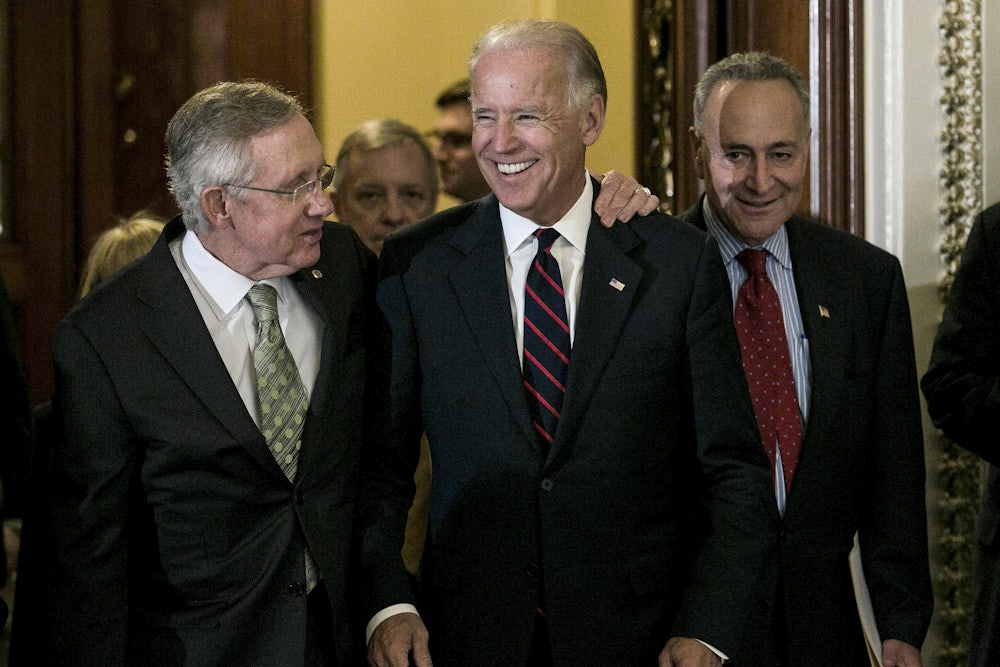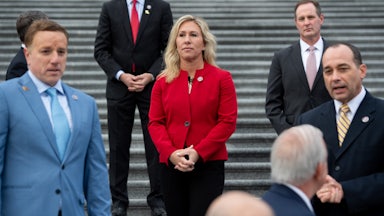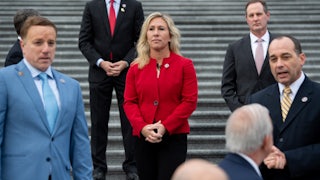There is a story about Joe Biden that has been retold many times in the press over the last several years, largely because it seems to illuminate his political sensibilities and penchant for dealmaking. Noam Scheiber told an early version of this story right here in The New Republic. And it showed up more recently in Alex Thompson’s Politico Magazine feature on Biden’s relationship with Mitch McConnell.
In short, in late December 2012, Congress faced a (self-imposed) economic disaster called the “fiscal cliff,” which would have led to massive budget cuts and tax increases had Congress not stepped in to avert it with a necessarily bipartisan agreement. Senate Democratic Majority Leader Harry Reid’s plan was to go off the cliff, to force Republicans to accept higher taxes for the rich. At the last minute, before reaching the cliff, Vice President Joe Biden swooped in to take over negotiations, cutting a deal that, as Mitch McConnell would brag, retained “99 percent of the Bush tax cuts.”
Another reason this story has probably been told so many times, other than the insight it provides into Biden’s politics, is that Reid and his former aides have been furious about it ever since. Biden, for his part, believed—and still believes—he cut a great deal; he bragged about it as recently as 2019, in a primary debate. His pride in the outcome reflects a mindset that takes hold among many long-term inhabitants of Congress: They believe that the deal is the goal and that cutting bipartisan compromises will be enough to prove to voters that government “works,” even if those compromises fall short of delivering tangible, real-world results. That’s how a party can spend 10 years running on repealing tax cuts for the wealthy and then decide overnight to make most of them permanent—you simply can’t let your promises to voters stand in the way of your responsibility to find common ground with the other side.
There was some reason to worry, then, at the beginning of this week, when a group of 10 Republican senators received an audience with President Biden to discuss the economic relief package currently making its way through the Democrat-run Congress. Those senators had just released a sketchy framework for an alternative to the White House’s package. In traditional Senate style, it mainly took what had already been proposed and arbitrarily cut a bunch of the numbers either in half or all the way to zero. When it comes time to negotiate legislation, our lawmakers abandon any pretense of seeing bills in terms of whether they solve the problems they are purported to address. Everything is abstracted into some dollar amount a senator is or isn’t comfortable with.
The fear that Biden would fall for this feint stemmed from his long record of making deals with the opposition: Perhaps the president—who had promised the American people that he alone had the background and character to bring Republicans back to the negotiating table—would become so giddy at the prospect of passing his first major piece of legislation with bipartisan support that he would decide to meet these Republicans in what he considered the middle, needlessly making the relief bill less generous in order to make it more palatable to Republicans (who would likely have still found some reason to withhold their support in the end anyway).
Practically preempting this fear, Democratic Senate Majority Leader Chuck Schumer stated plainly that his caucus would not allow a dangled promise of bipartisan cooperation to delay and eventually sabotage the rescue package. The day after that White House meeting, the Senate began the process of passing the bill through reconciliation, which will allow it to clear the chamber with a simple majority vote—all 50 Democratic senators and no Republicans.
Democrats had learned the lessons of the Obama years, the quotes and headlines and newsletters announced. Over-delivering was preferable to under-delivering, Biden firmly told his allies in Congress. He had made a promise, and, as Bloomberg put it, “backing anything less than $1,400 stimulus checks would mean starting his presidency with a broken promise.” (The fact that Biden initially seemed to have promised the immediate delivery of $2,000 in January, and not delivery of $1,400 at some point in March, was the subject of much online debate but seemingly less concern on the Hill.)
Senator Joe Manchin, the most conservative Democrat in the Senate, was convinced. $1.9 trillion was not too much money, and the Republicans couldn’t be trusted to negotiate in good faith with their Democratic counterparts.
Then, upon very publicly determining to go it alone, the Democrats began negotiating among themselves, as the more conservative members of their caucus sought to make the centerpiece of the package stingier. Seemingly overnight, talk of Biden being open to narrowing eligibility for the $1,400 stimulus payments became a new (but still not finalized) plan to do so. If he does move forward with the narrower plan, Biden will have actively broken what he claimed was a promise that all the households that qualified for the earlier round of $600 payments would receive another check.
Because no one has come forward to claim responsibility for their role in convincing Biden to narrow the eligibility requirements, we do not have their justification for doing so. One can only speculate that it was done in the name of saving (according to an estimate from the Committee for a Responsible Federal Budget) about $25 billion, in a bill that has already been arbitrarily capped at $1.9 trillion total, perhaps because hitting $2 trillion might allow its opponents to pluralize “trillions” when attacking it.
It seems that the senatorial fetish for compromise in the service of making numbers smaller is still in effect. And this is perhaps one sign that things haven’t changed as much as pundits were claiming earlier this week: Without Republicans to cede ground to, Democrats are simply ceding it to themselves.
But in terms of lessons learned from 2009, it’s even more interesting that no Democrats (yet) have taken public credit for their moderating influence on this bill. Informed liberals have no Max Baucus on whom to train their ire (even if we can just assume it was Joe Manchin). As I wrote last month, people invested in the success of a Biden administration have less to worry about from politicians afraid to do unpopular things than they do from lawmakers who wish to block (or delay, or water down) popular things without taking public responsibility for doing so. This probably won’t be the last time Democrats in the Biden era end up cutting compromises with seemingly nonexistent negotiating partners.








